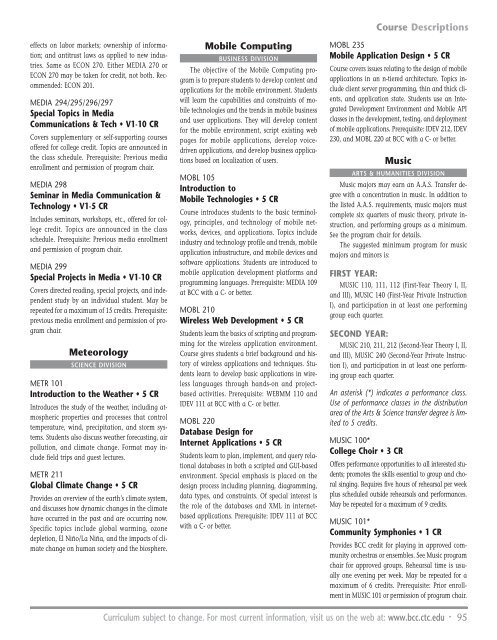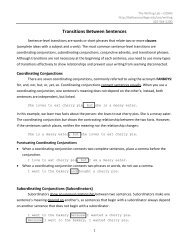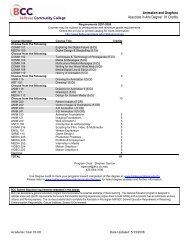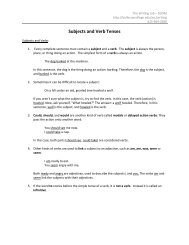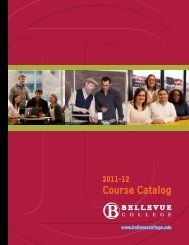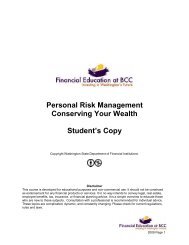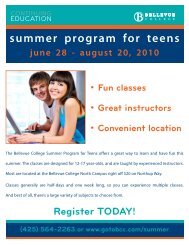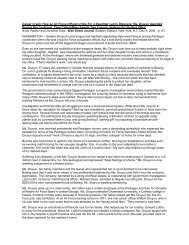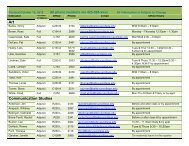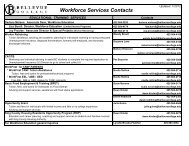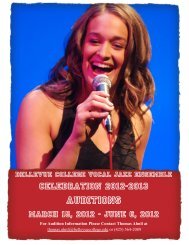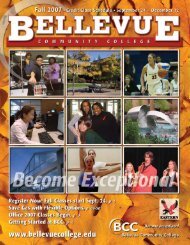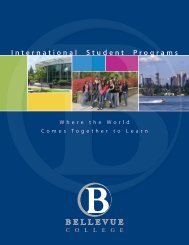2003 / 2004 - Bellevue College
2003 / 2004 - Bellevue College
2003 / 2004 - Bellevue College
Create successful ePaper yourself
Turn your PDF publications into a flip-book with our unique Google optimized e-Paper software.
effects on labor markets; ownership of information;<br />
and antitrust laws as applied to new industries.<br />
Same as ECON 270. Either MEDIA 270 or<br />
ECON 270 may be taken for credit, not both. Recommended:<br />
ECON 201.<br />
MEDIA 294/295/296/297<br />
Special Topics in Media<br />
Communications & Tech • V1-10 CR<br />
Covers supplementary or self-supporting courses<br />
offered for college credit. Topics are announced in<br />
the class schedule. Prerequisite: Previous media<br />
enrollment and permission of program chair.<br />
MEDIA 298<br />
Seminar in Media Communication &<br />
Technology • V1-5 CR<br />
Includes seminars, workshops, etc., offered for college<br />
credit. Topics are announced in the class<br />
schedule. Prerequisite: Previous media enrollment<br />
and permission of program chair.<br />
MEDIA 299<br />
Special Projects in Media • V1-10 CR<br />
Covers directed reading, special projects, and independent<br />
study by an individual student. May be<br />
repeated for a maximum of 15 credits. Prerequisite:<br />
previous media enrollment and permission of program<br />
chair.<br />
Meteorology<br />
SCIENCE DIVISION<br />
METR 101<br />
Introduction to the Weather • 5 CR<br />
Introduces the study of the weather, including atmospheric<br />
properties and processes that control<br />
temperature, wind, precipitation, and storm systems.<br />
Students also discuss weather forecasting, air<br />
pollution, and climate change. Format may include<br />
field trips and guest lectures.<br />
METR 211<br />
Global Climate Change • 5 CR<br />
Provides an overview of the earth’s climate system,<br />
and discusses how dynamic changes in the climate<br />
have occurred in the past and are occurring now.<br />
Specific topics include global warming, ozone<br />
depletion, El Niño/La Niña, and the impacts of climate<br />
change on human society and the biosphere.<br />
Mobile Computing<br />
BUSINESS DIVISION<br />
The objective of the Mobile Computing program<br />
is to prepare students to develop content and<br />
applications for the mobile environment. Students<br />
will learn the capabilities and constraints of mobile<br />
technologies and the trends in mobile business<br />
and user applications. They will develop content<br />
for the mobile environment, script existing web<br />
pages for mobile applications, develop voicedriven<br />
applications, and develop business applications<br />
based on localization of users.<br />
MOBL 105<br />
Introduction to<br />
Mobile Technologies • 5 CR<br />
Course introduces students to the basic terminology,<br />
principles, and technology of mobile networks,<br />
devices, and applications. Topics include<br />
industry and technology profile and trends, mobile<br />
application infrastructure, and mobile devices and<br />
software applications. Students are introduced to<br />
mobile application development platforms and<br />
programming languages. Prerequisite: MEDIA 109<br />
at BCC with a C- or better.<br />
MOBL 210<br />
Wireless Web Development • 5 CR<br />
Students learn the basics of scripting and programming<br />
for the wireless application environment.<br />
Course gives students a brief background and history<br />
of wireless applications and techniques. Students<br />
learn to develop basic applications in wireless<br />
languages through hands-on and projectbased<br />
activities. Prerequisite: WEBMM 110 and<br />
IDEV 111 at BCC with a C- or better.<br />
MOBL 220<br />
Database Design for<br />
Internet Applications • 5 CR<br />
Students learn to plan, implement, and query relational<br />
databases in both a scripted and GUI-based<br />
environment. Special emphasis is placed on the<br />
design process including planning, diagramming,<br />
data types, and constraints. Of special interest is<br />
the role of the databases and XML in internetbased<br />
applications. Prerequisite: IDEV 111 at BCC<br />
with a C- or better.<br />
MOBL 235<br />
Mobile Application Design • 5 CR<br />
Course covers issues relating to the design of mobile<br />
applications in an n-tiered architecture. Topics include<br />
client server programming, thin and thick clients,<br />
and application state. Students use an Integrated<br />
Development Environment and Mobile API<br />
classes in the development, testing, and deployment<br />
of mobile applications. Prerequisite: IDEV 212, IDEV<br />
230, and MOBL 220 at BCC with a C- or better.<br />
Music<br />
ARTS & HUMANITIES DIVISION<br />
Music majors may earn an A.A.S. Transfer degree<br />
with a concentration in music. In addition to<br />
the listed A.A.S. requirements, music majors must<br />
complete six quarters of music theory, private instruction,<br />
and performing groups as a minimum.<br />
See the program chair for details.<br />
The suggested minimum program for music<br />
majors and minors is:<br />
FIRST YEAR:<br />
MUSIC 110, 111, 112 (First-Year Theory I, II,<br />
and III), MUSIC 140 (First-Year Private Instruction<br />
I), and participation in at least one performing<br />
group each quarter.<br />
SECOND YEAR:<br />
MUSIC 210, 211, 212 (Second-Year Theory I, II,<br />
and III), MUSIC 240 (Second-Year Private Instruction<br />
I), and participation in at least one performing<br />
group each quarter.<br />
An asterisk (*) indicates a performance class.<br />
Use of performance classes in the distribution<br />
area of the Arts & Science transfer degree is limited<br />
to 5 credits.<br />
MUSIC 100*<br />
<strong>College</strong> Choir • 3 CR<br />
Course Descriptions<br />
Offers performance opportunities to all interested students;<br />
promotes the skills essential to group and choral<br />
singing. Requires five hours of rehearsal per week<br />
plus scheduled outside rehearsals and performances.<br />
May be repeated for a maximum of 9 credits.<br />
MUSIC 101*<br />
Community Symphonies • 1 CR<br />
Provides BCC credit for playing in approved community<br />
orchestras or ensembles. See Music program<br />
chair for approved groups. Rehearsal time is usually<br />
one evening per week. May be repeated for a<br />
maximum of 6 credits. Prerequisite: Prior enrollment<br />
in MUSIC 101 or permission of program chair.<br />
Curriculum subject to change. For most current information, visit us on the web at: www.bcc.ctc.edu • 95


